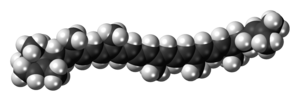
| |

| |
| Names | |
|---|---|
| IUPAC name
ε,ψ-Carotene
| |
| Systematic IUPAC name
(6R)-6-[(1E,3E,5E,7E,9E,11E,13E,15E,17E,19E)-3,7,12,16,20,24-Hexamethylpentacosa-1,3,5,7,9,11,13,15,17,19,23-undecaen-1-yl]-1,5,5-trimethylcyclohex-1-ene | |
| Identifiers | |
3D model (JSmol)
|
|
| ChemSpider | |
PubChem CID
|
|
| UNII | |
| |
| |
| Properties | |
| C40H56 | |
| Molar mass | 536.873 |
Except where otherwise noted, data are given for materials in their standard state (at 25 °C [77 °F], 100 kPa).
| |
δ-Carotene (delta-carotene) or ε,ψ-carotene is a form of carotene with an ε-ring at one end, and the other uncyclized, labelled ψ (psi). It is an intermediate synthesis product in some photosynthetic plants between lycopene and α-carotene (β,ε-carotene) or ε-carotene (ε,ε-carotene).[1] δ-Carotene is fat soluble. Delta-carotene contains an alpha-ionone instead of a beta-ionone ring;[2] this conversion is carried out by the gene Del which shifts the position of the double bond in the ring structure. The formation delta-carotene under the presence of the Del gene is sensitive to high temperatures.[3]
References[edit]
- ^ Cunningham FX, Gantt E (February 2001). "One ring or two? Determination of ring number in carotenoids by lycopene epsilon-cyclases". Proceedings of the National Academy of Sciences of the United States of America. 98 (5): 2905–10. doi:10.1073/pnas.051618398. PMC 30238. PMID 11226339.
- ^ Tomes ML (August 1969). "Delta-carotene in the tomato". Genetics. 62 (4): 769–80. doi:10.1093/genetics/62.4.769. PMC 1212314. PMID 17248458.
- ^ Tomes ML (June 1967). "The competitive effect of the Beta- and delta-carotene genes on alpha- or Beta-ionone ring formation in the tomato". Genetics. 56 (2): 227–32. doi:10.1093/genetics/56.2.227. PMC 1211498. PMID 17248383.